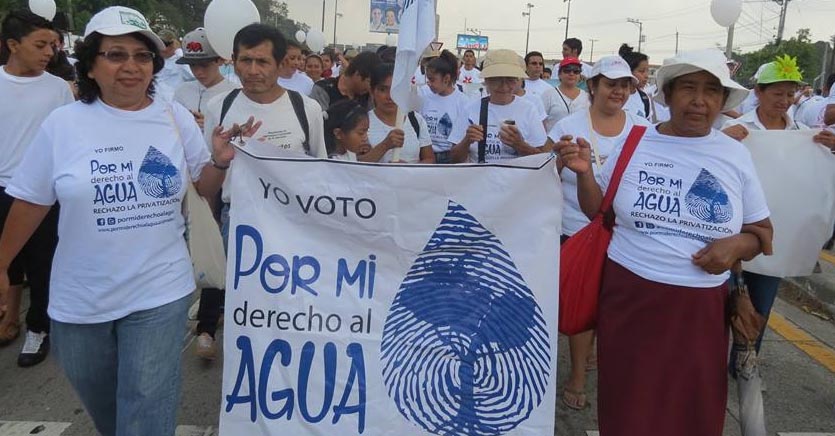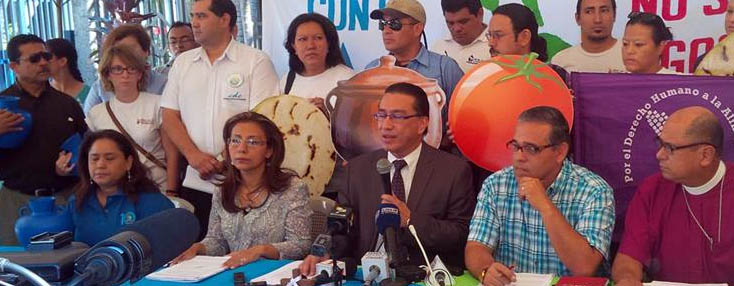P. Cabezas
Environmental organizations poised to have a ratification vote before the legislature dissolves on April 30th.
 An open letter addressed to to president of El Salvador from the UN’s Special Rapporteurs on the Right to Water, Leo Heller, and Special Rapporteur on Food, Hila Lever, has become the latest salvo in a high profile campaign led by Salvadorean environmental organizations seeking to salvage a last minute deal to enshrine the rights to food and water in the constitution.
An open letter addressed to to president of El Salvador from the UN’s Special Rapporteurs on the Right to Water, Leo Heller, and Special Rapporteur on Food, Hila Lever, has become the latest salvo in a high profile campaign led by Salvadorean environmental organizations seeking to salvage a last minute deal to enshrine the rights to food and water in the constitution.
For more than six years a diverse movement of civil society organizations, accompanied by the Ombudsman for the Defense of Human Rights of El Salvador, have campaigned to reform Article 69 of the Constitution of the Republic to include provisions for the protection and guarantee of the rights to adequate and equal access to food and water for the population.
But, negotiations to approve a General Water Law, a Food Sovereignty Law and to constitutionally recognize the right to food and water have reached a stalemate stemming from fundamental ideological differences from the political parties that make up the legislature.
One the one hand, the left leaning FMLN and centre right GANA parties have the supported legislation proposals brought forwards by social organizations calling for the public administration of water and government support to strengthen the agricultural sector. But the right leaning ARENA, PCN and PDC parties have opposed public administration and have instead advocated for the involvement of the private sector and the inclusion of market based solutions in the regulation of the water and food resources.
The campaign to approve a general water law received a boost in 2010 after the United Nations issued a resolution on the right to water and called for member states to “provide safe, clean, accessible and affordable drinking water and sanitation for all”.
Members for the Environmental Alliance - a hub for diverse environmental coalitions that seek a green agenda for El Salvador- took this opportunity to introduce legislative proposals to reflect the principles established by the UN and proposals for a constitutional reform to recognize the rights to food and water a basic human rights.
In April 2012 a partial victory was won as the outgoing 2009-2012 legislature voted overwhelmingly to approve the constitutional reform with the support of 81 out the 84 Members of the Legislative Assembly.
But, a ratification vote by the following legislature, held in October 2014, failed to achieve the qualified majority (56 out of 84 votes) required by legislative procedure on all constitutional reforms.
Last minute efforts for ratification
Since October, environmental organizations have intensified their campaign to pressure the outgoing legislature to hold a second ratification vote before its terms expires in April 2015.

The campaign has managed to pick up high profile endorsements including the President of the Republic, Salvador Sanchez Ceren, the Minister of the Environment Lina Pohl, and the Minister of agriculture, Orestes Ortez, among many politicians who have called on members of the legislature to set aside their political differences in the name of the greater good.
Robert Valente, Coordinator of the UN in El Salvador, added his voice by calling members of the legislature to overcome their ideological differences to ratify the right to food and water on behalf of “47.8 of the rural population” who lack access to potable drinking water El Salvador.
More recently the Archbishop of El Salvador Jose Luis Alas asked legislators to reconsider their commitment to ratify of the right to water before the end of the legislative period on April 31st, and suggested that as “fathers of the motherland” they could not deny a right that would benefit the entire population.
But despite of the relentless campaigning which has also included permanent rallies in front of the legislative building, direct actions and petitions signed by tens of thousands of citizens and hundreds of national and international organizations the pressure has proven ineffective.
The parliamentary commission on Electoral and Constitutional Reforms, in charge of tabling the reform in the legislative agenda, has failed to discuss the point over the last five months. And lately, meetings of the commission have been boycotted by members of the right wing parties, a tactic often utilized in parliamentary politics to break quorum and stall debate on a particular issue. As a result of this inaction the Ombudsman for the Defense of Human Rights issued a formal resolution declaring that the legislative assembly in contempt for neglecting to protect the human rights of the population.
The letter from the UN water and food rapporteurs, which asks the president “to inform immediately of our previous call to all state institutions that have any responsibility on the matter to report on what measures have been taken to ratify such constitutional reform”, adds pressure on the legislature to reconsider a vote, but only eight days before the current legislature dissolves, it appears that environmental and human rights movements in El Salvador are set to suffer a substantial set back.
With only one plenary session left, on April 30th, the possibility of holding a vote is quickly vanishing, but in the unpredictable world of Salvadorean politics, a week of parliamentary process and one plenary session may be more than enough to build political consensus on a matter of national interest.
